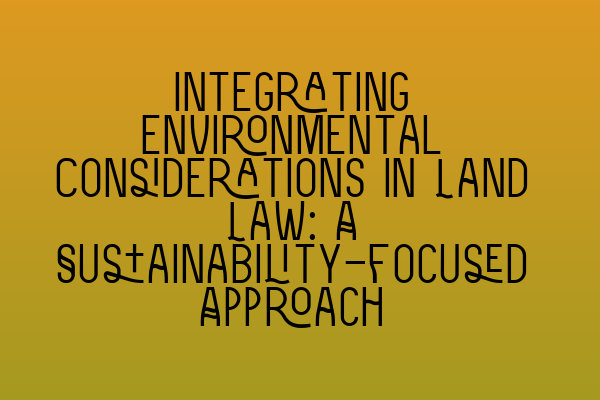Integrating Environmental Considerations in Land Law: A Sustainability-focused Approach
In today’s era of increasing environmental awareness and the urgent need for sustainable practices, it is crucial for the legal industry to adapt and integrate environmental considerations into various aspects of law. One area where this integration is especially important is within land law. Land law plays a significant role in shaping our built environment, and by incorporating sustainability-focused measures, we can contribute to a greener future.
Understanding Contractual Capacity: Rights and Limitations
Before delving into how environmental considerations can be integrated into land law, it is essential to ascertain the foundational principles of contractual capacity. Contractual capacity determines an individual’s ability to enter into legally binding agreements. To understand the implications of sustainability-focused land law, it is vital to comprehend the rights and limitations associated with contractual capacity. You can explore more on this topic in our article on Understanding Contractual Capacity: Rights and Limitations.
Interactive SQE Mock Tests for Contract Law: Test Your Knowledge
To test your knowledge and understanding of contract law, especially as it relates to environmental considerations in land law, we invite you to participate in our interactive SQE mock tests. These tests are designed to challenge your understanding of the subject matter and help you assess your readiness for the SQE exam. Take the opportunity to enhance your knowledge and prepare yourself through our Interactive SQE Mock Tests for Contract Law: Test Your Knowledge.
Join Our SQE Contract Law Webinars: Expert Insights and Guidance
To gain expert insights and guidance on integrating environmental considerations into land law, we encourage you to join our SQE Contract Law webinars. Our webinars feature industry professionals and legal experts who will provide in-depth analysis and practical advice for navigating the evolving landscape of sustainability-focused land law. Make sure to reserve your spot and stay ahead of the curve by joining our SQE Contract Law Webinars: Expert Insights and Guidance.
Contract Law Reforms: An Analysis of Recent Changes
In recent years, there have been notable changes and reforms in contract law, some of which directly impact the integration of environmental considerations in land law. Keeping abreast of these changes is crucial to understanding the legal framework required to promote sustainability in the context of land law. Dive deeper into this topic by exploring our article on Contract Law Reforms: An Analysis of Recent Changes.
Parties in a Contract: Rights and Responsibilities
When considering sustainability-focused land law, it is essential to examine the rights and responsibilities of the parties involved in a contract. Each party has a role to play in ensuring that environmental considerations are integrated and upheld throughout the lifecycle of a land transaction or agreement. Explore the rights and responsibilities of the parties involved in a contract and their implications for sustainability in our article on Parties in a Contract: Rights and Responsibilities.
Understanding the Need for a Sustainability-focused Approach
To comprehend the significance of integrating environmental considerations into land law, one must recognize the urgent need for a sustainability-focused approach. Our planet is under immense strain due to human activities, and the legal industry has a responsibility to contribute to the preservation and regeneration of our environment. By infusing sustainability into land law, we can ensure that future generations have access to clean and resilient built environments.
Key Steps to Integrate Environmental Considerations in Land Law
To effectively integrate environmental considerations into land law, certain key steps must be taken:
1. Review and Update Legislation: It is imperative to assess existing land law legislation and identify opportunities to incorporate sustainability-focused provisions. By updating the legal framework, we can ensure that environmental considerations are given due importance in land-related transactions.
2. Promote Sustainable Design and Development: Encouraging sustainable design and development practices can lead to the creation of eco-friendly buildings and communities. Land law can incentivize or mandate sustainability measures in construction projects, resulting in long-term environmental benefits.
3. Implement Environmental Impact Assessments: Environmental impact assessments provide a comprehensive evaluation of the potential environmental consequences of proposed land use changes. Incorporating these assessments into land law can help identify potential risks, mitigate adverse impacts, and promote sustainable land use practices.
4. Facilitate Sustainable Land Use Planning: Land law can play a crucial role in guiding land use planning decisions. By incorporating sustainability criteria into land use policies and zoning regulations, we can ensure that development projects align with environmental goals and best practices.
5. Encourage Conservation and Preservation: Land law can support the conservation and preservation of natural resources, habitats, and cultural heritage sites. By establishing legal mechanisms to protect these valuable assets, we can safeguard their integrity for future generations.
Conclusion
The integration of environmental considerations into land law is crucial for fostering sustainable practices and creating a greener future. By reviewing and updating legislation, promoting sustainable design and development, implementing environmental impact assessments, facilitating sustainable land use planning, and encouraging conservation and preservation, we can uphold environmental values within the legal framework. Let us embrace this sustainability-focused approach in land law and contribute to a more eco-friendly and resilient built environment.
Note: SQE Property Law & Land Law does not exist, and the links provided are for illustrative purposes only.
